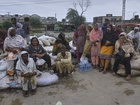Hurricane Kiko was on a path toward Hawaii over the next several days as post-tropical cyclone Lorena soaked Mexico's Baja California peninsula with heavy rain, forecasters said Friday.
Kiko was a Category 3 hurricane, but far enough away from the Hawaiian Islands that the National Hurricane Center in Miami said it was too early to tell the exact location and severity of impacts expected to reach the 50th U.S. state around the middle part of next week.
 Full Story
Full Story
Pope Leo XIV fed fish in the fishpond, pet horses and visited organic vineyards Friday as he inaugurated the Vatican's ambitious project to turn Pope Francis' preaching about caring for the environment into practice.
Leo formally opened Borgo Laudato Si, a 55-acre utopian experiment in sustainable farming, vocational training and environmental education located on the grounds of the papal summer retreat in Castel Gandolfo. The Vatican hopes the center, open to student groups, CEOs and others, will be a model of ecological stewardship, education and spirituality for the Catholic Church and beyond.
 Full Story
Full Story
Authorities in Pakistan's southern Sindh province have evacuated more than 100,000 people from low-lying areas along the Indus river, a government spokesman said on Friday, after neighboring India warned of cross-border flooding from dam release.
The evacuations come as rescuers mounted a major rescue and relief operation in the country's eastern Punjab province, where flooding from weeks of monsoon rains and overflowing dams in India has displaced about 1.8 million people since August.
 Full Story
Full Story
Deep in Earth's past, an icy landscape became a seascape as the ice melted and the oceans rose off what is now the northeastern United States. Nearly 50 years ago, a U.S. government ship searching for minerals and hydrocarbons in the area drilled into the seafloor to see what it could find.
It found, of all things, drops to drink under the briny deeps — fresh water.
 Full Story
Full Story
The worst drought in decades is gripping much of the Eastern Mediterranean and Middle East, drying out rivers and lakes, shriveling crops and leading to dayslong tap water cutoffs in major cities.
The situation is particularly dire in Syria, where experts say rainfall has been declining for decades and where the fledgling government is trying to stitch the country back together following a 14-year civil war that left millions impoverished and reliant on foreign aid.
 Full Story
Full Story
A quick-moving wildfire burned homes in a California Gold Rush town settled around 1850 by Chinese miners who were driven out of a nearby camp and the blaze grew without containment on Wednesday.
The fire rapidly expanded to 10 square miles (26 square kilometers) in size, forcing the evacuation Tuesday of the Chinese Camp Town and surrounding highways, according to CalFire, the state's chief fire agency. There were no immediate reports of injuries or deaths.
 Full Story
Full Story
India warned Pakistan about possible cross-border flooding for the second time in as many weeks as monsoon deluges cause death and widespread destruction in both countries.
The disaster management authority in eastern Pakistan announced the warning Tuesday.
 Full Story
Full Story
A landslide wiped out a village in Sudan 's western region of Darfur, killing an estimated 1,000 people in one of the deadliest natural disasters in the African country's recent history, a rebel group controlling the area said late Monday.
The tragedy happened Sunday in the village of Tarasin in Central Darfur's Marrah Mountains after days of heavy rainfall, the Sudan Liberation Movement-Army said in a statement.
 Full Story
Full Story
Emergency workers in Pakistan's Punjab province used drones to find people stranded on rooftops by massive floods as the government expanded its rescue operation with more than 900,000 evacuated, officials said Monday.
The Pakistan Meteorological Department warned of more heavy rain in Punjab's flood-hit districts and elsewhere in the country, where weeks of above-normal rainfall and the release of huge volumes of water from dams in neighboring India last week caused rivers to overflow into low-lying regions.
 Full Story
Full Story
Seen from the air, a Florida freshwater spring is a bit of liquid heaven, luring humans and wildlife to enjoy its aquamarine cool. With at least 1,000 of them — more than any other state — the springs serve as beaches for large swaths of central and northwestern Florida far from the ocean, with teenagers backflipping from docks and snorkelers peering into the crystalline depths.
But these treasures are under threat from agricultural pollution, rapid development and climate change.
 Full Story
Full Story



